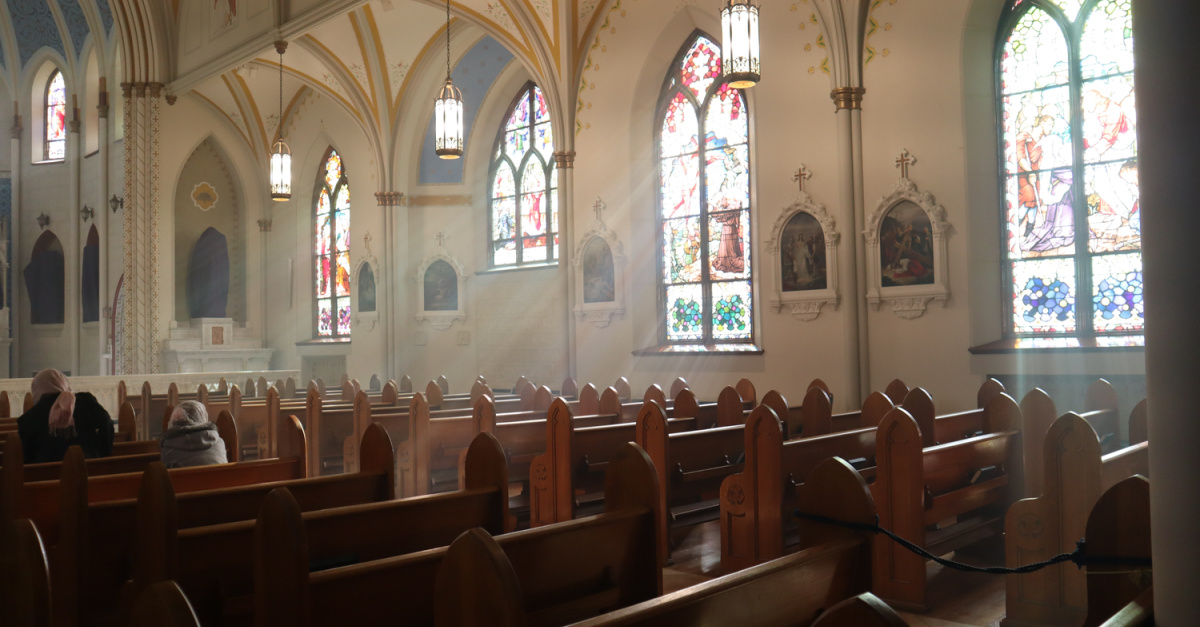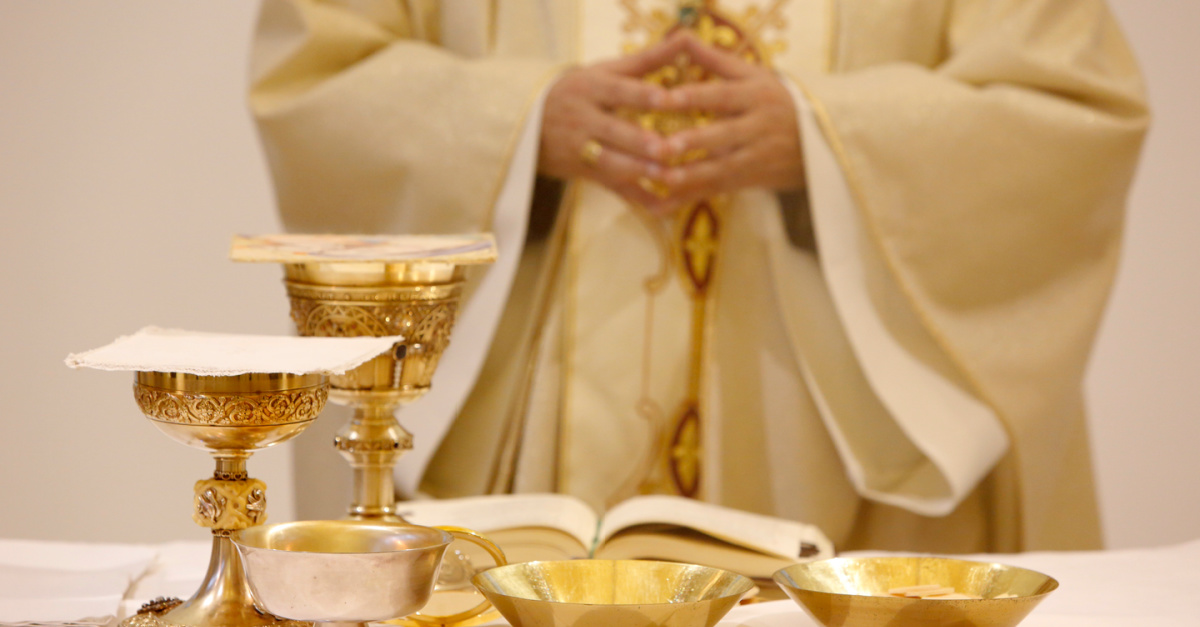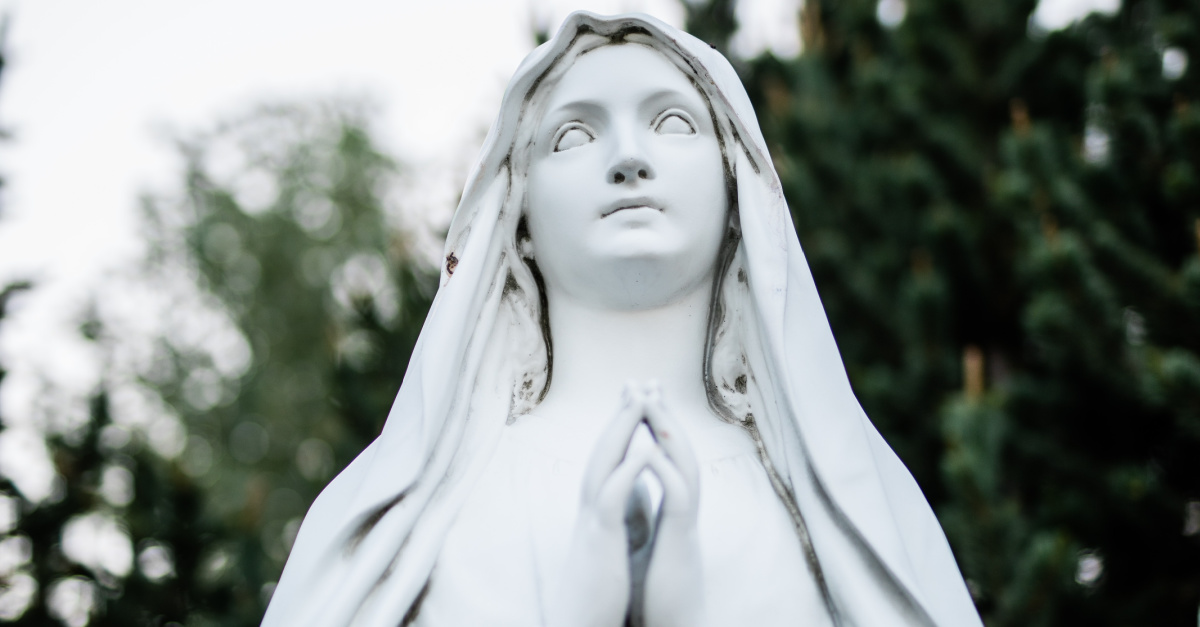
“Just as a body, though one, has many parts, but all its many parts form one body, so it is with Christ.” (1 Corinthians 12:12)
There are Catholics. There are Protestants. Even within those two groups, there are plenty of sects and denominations to be found. We read the same book, but come away with such different interpretations. For someone with a (sometimes too) curious and (far too) anxious mind, a question arises.
Why?
Why are there so many denominations?
Why do we understand God so differently?
Why is the church seemingly split into so many parts?
I’ll be the first to tell you, I didn’t grow up in the church. Even today, I don’t always quite feel at home, like I’m with family, let alone friends. I’m no expert on theology, but I love to learn. And church has allowed me to learn from fascinating people, many of whom think differently than me. One thing I’ve heard from time and time is that Catholics are not Christians.
Why?
They told me what Catholics believe, who they worship, even that they are a “cult.” Unsurprisingly, the person sharing was not Catholic. More unsurprisingly, after I asked whether they expressed these concerns to a Catholic, they said, “No.”
Experience shows, we learn when we talk to people. Not those who think like we do, but those who can teach us something new, something different. That’s why unlike my fellow Protestants, I sought out and found a Catholic, so that I could learn just what they think, not secondhand, but right from the source.
Thus, in stepped Jenna, a young, intelligent, charismatic woman born and raised Catholic. We met after I visited a local church, which she too was visiting. I asked her the question I always ask. Here’s what she said.
Photo Credit: Channel 82/Unsplash
Q: What is the background of your faith? Were you raised Catholic?
I was raised in a two-parent, conservative Catholic household in Northern Virginia alongside my two sisters. I was baptized as an infant and grew up in the Catholic faith. We went to Mass every weekend and on all Holy Days, and I received all my sacraments (Baptism, First Confession, First Communion, and Confirmation) at our home church.
From Kindergarten to 3rd Grade, I was homeschooled using two curriculums (a Catholic curriculum and a Christian curriculum). When I began attending public school in 4th Grade, I then attended Catholic education classes at my church every week, and these classes continued even when I switched to a private non-denominational Christian middle school for 6th, 7th, and 8th grade. Every summer, from age 8-18, I attended a 2-week Christian sports camp in the mountains of Pennsylvania, and in middle school, I belonged to a youth group at a Methodist Church with some of my Christian friends. One of my best friends is Baptist, and I often attend services with her and discuss issues of faith. Thus, growing up, I always had friends and peers of different Christian faiths, and I learned many different perspectives and viewpoints on the Bible and its teachings.
How did you decide as an individual to maintain your religion?
J: Having been raised in the Catholic faith by an immediate and extended family of devout Catholics, I was encouraged and expected to study Catholic doctrine and apologetics, both through organized religion classes and on my own. My parents ensured that I was baptized as an infant (as is customary in the Catholic Church), and that I received the sacraments of Confession and Holy Communion in the first and third grade, respectively. As mentioned previously, I attended a non-denominational Christian middle school for three years. At this school, I was met with many questions, from peers and teachers alike, who didn’t understand or agree with my beliefs – specifically on matters pertaining to Mary, the Eucharist as the true Body, Blood, Soul, and Divinity of Jesus, the Pope and papal infallibility, and the seven sacraments.
These experiences led me to desire to have a deeper understanding of my Catholic faith, not only to grow my relationship with the Lord but also effectively communicate my beliefs to those around me. This decision also coincided with receiving the sacrament of Confirmation at age 13, through which the Holy Spirit imparts additional sanctifying grace on the recipient. In the Catholic Church, this sacrament is recognized as the pivotal moment in a Catholic’s life where they profess their belief and accept the challenge of always acting in strength and courage to defend and fight for their faith. I received the sacrament of Confirmation with full recognition of the importance of my faith and my responsibility to serve the body of Christ.
What does Catholic mass entail?

J: Most simply, Mass is a holy celebration of Jesus’ life and ultimate sacrifice for us on the cross. Catholics are obligated to attend Mass each week (at a minimum) to receive the Body and Blood of Christ in the Eucharist. Mass itself contains four main parts or ‘rites.’ The first rite, or the Introductory Rite, begins with a hymn and the procession of the priest to the altar. This is followed by internal reflection and communal prayers. During the second rite (the Liturgy of the Word), we listen to two readings from the Bible (typically one from the Old Testament and one from the New Testament, and a psalm is prayed or sung between the two readings. The final third reading is always from the Gospel of Matthew, Mark, Luke, or John, and this reading typically explains how Jesus fulfilled the prophecies of the Old Testament reading.
After the Gospel reading, the priest will give his homily (his sermon) during which he explains or relates the passages to each other and our daily lives. The Liturgical rite ends after we recite the Nicene Creed, which is a public profession of our Catholic faith in God. The third part of the Mass is called the Liturgy of the Eucharist. During this part of the Mass, offerings of bread and wine are presented to the priest, and he consecrates the offerings. This is the most sacred part of Mass, since through this consecration, the bread and wine transubstantiate (or change in substance) into the Body and Blood of Christ. All practicing Catholics who are not in a state of mortal sin then proceed to the altar to receive the Body and Blood of Jesus. The final part of the Mass, the Concluding Rite, provides us time to reflect on the Eucharist through prayer. Finally, to end the Mass, we receive the priest’s blessing before singing a closing hymn.
Since we believe that we are truly receiving the Body and Blood of Christ through the Eucharist, it is a moral obligation for Catholics to attend Mass weekly and on Holy Days of Obligation during the year. Every Catholic church throughout the entire world will celebrate each of these rites in an identical order and fashion. This is one of the things I love most about the Catholic faith – the Church is one, holy, Catholic, and Apostolic.
Do Catholics worship Jesus?
J: As do other Christian denominations, Catholics worship Jesus as He is the One and Only God in three divine Persons (the Father, Son, and Holy Spirit), and He is the one true Savior of the world. Protestants will often say that Catholics worship Mary and the Saints, but this is not true; Mary and the Saints deserve honor, however, God deserves our worship.
Photo Credit: ©Getty Images/Philippe Lissac
What are some notable differences between the Catholic and Protestant faiths?
J: I have had many conversations with friends of the Protestant faith, and most of their questions concern the following: infant baptism, Confession, the Eucharist, honoring Mary and the Saints, the Pope, Purgatory, and Contraception/Abortion. Catholics believe in baptizing infants to remove Original Sin and bestow grace, while Protestants see baptism only as a symbolic washing that signifies the person has accepted Jesus as their Lord and Savior. Catholics also believe in a formal confession of their sins to God (who alone has the power to forgive sins) through a priest, who like the early Apostles, is an instrument for the forgiveness of sins. Protestants believe in confessing their sins directly to God, without a priest present. In regard to the Eucharist, Catholics believe that through transubstantiation we receive the actual Body and Blood of Jesus in the Eucharist. Protestants believe that the bread and wine are merely a symbolic celebration of the Last Supper.
As mentioned above, Catholics worship God (the Father, Son, and Holy Spirit), while also honoring Mary and the Saints. Most Protestants do not understand the difference between our worship of God and our honor for Mary and the Saints. Catholics believe that God appointed Peter as the head of the church and thus, Peter and Peter’s successors (the Popes) with special authority to spiritually lead Christian believers. Protestants do not view the Pope as the supreme head of the church on earth. Another point of dissension is Purgatory; unlike Protestants, Catholics believe in Purgatory as a state of existence after death during which we will be purged of our sins before entering Heaven. Finally, Catholics believe in the sanctity of all human life – from conception to natural death – and Catholic doctrine very clearly does not support abortion or any type of contraception. Within the Christian faith and even the Catholic Church, there is dissention on this topic, however, formal Catholic teachings prohibit either of these practices.
Do Catholics worship Mary and the Saints?
J: As mentioned previously, Catholics worship and adore God in the Holy Trinity, but honor Mary and the Saints. There is an important distinction here between worshiping and honoring. Without God, Mary and the Saints have no meaning or independent power. Catholics understand that adoration is given to God, and that veneration is given to Mary and the Saints. Mary specifically is honored because she was conceived without sin, bore the Son of God, and was assumed bodily into Heaven. She has the most intimate relationship with God and draws us closer to Him rather than distracting from His glory.
Why do you pray to Mary and the Saints?

J: It is true that we pray to Mary and the Saints, however, our prayers are for Mary and the Saints to intercede for us and strengthen us in our faith in Jesus. This is not unlike asking a friend, family member, or pastor to pray for us, and in fact it continues the ancient Christian tradition of paying respect to and asking for intercession from those that are in Heaven. In the Apostle’s Creed, which is recited by Catholics and many Protestants, we state our belief in the “communion of Saints,” which refers to the unity between all believers, both living and dead. In Romans 12:5 and 8:35-39, we are reminded that all Christians are members of Christ’s body, and that death cannot separate Christians from Christ or one another. As we should pray for and ask prayers of the members of the body of Christ, we believe Mary and the Saints are not excluded from this. In Revelation 8:3-4, we are told that the Angels and Saints place the prayers of the holy ones at God’s feet, supporting those prayers with their intercessions. Thus, Catholics call upon the Saints and Angels in Heaven to intercede for us before the throne of God.
What’s different about praying to Mary and the Saints compared with praying to God?
J: Protestants direct their prayers only to God (not to Mary and the Saints) as a form of worship and adoration. Catholics agree that only God deserves worship and adoration, however, we pray to Mary and the Saints to request their prayers and intercession for us, not to worship or adore them. This is clear in the Hail Mary, which is the most common prayer said when asking Mary to intercede for us. The first part of the prayer is taken directly from Luke 1:30 and Luke 1:43, and the second part of the prayer asks Mary to pray for us as sinners for we recognize our need for eternal salvation through God.
“Hail Mary,
Full of Grace,
The Lord is with thee.
Blessed art thou among women,
and blessed is the fruit
of thy womb, Jesus.
Holy Mary,
Mother of God,
pray for us sinners now,
and at the hour of our death.”
The only way Christians can work through their problems with one another is through communication. Implications, misinterpretations, and offense can all be put to rest when two people come together and hash things out. Sadly, communication is the same reason why many Christians encounter problems to start. The same reason one Christian may deny the faith of another.
The only way to understand why someone acts, thinks, or talks the way they do is to ask. Not just ask other people about them, but talk to them ourselves. Just as Jesus encourages us to be in community, we have to realize that there is no community apart from communication. Let’s do our part to communicate.
As I was answering these questions, I pulled on terminology and historical accounts from a number of different sources as listed below:
United States Conference of Catholic Bishops, 2022
Beginning Apologetics 1, 3 & 6 (Father Frank Chacon & Jim Burnham), 2010
Why We’re Catholic, Trent Horn, 2017
Catholic Answers Copyright, 2022
Eternal Word Television Network, Inc, 2022
Franciscan Media, 2021
Saint Joseph Addition of the New American Bible (1970)
To read more, see Part 2: What We Can Learn from a Catholic about Our Religious Differences – Part 2
Photo Credit: Grant Whitty/Unsplash